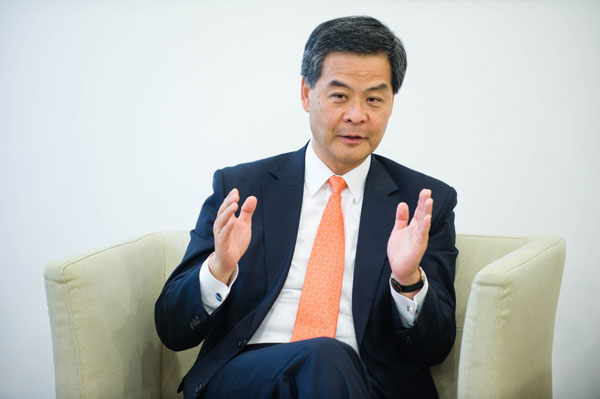Leung envisions Hong Kong's future
 0 Comment(s)
0 Comment(s) Print
Print E-mail China.org.cn, June 25, 2012
E-mail China.org.cn, June 25, 2012
Leung Chun-ying, the chief executive-elect of Hong Kong, maps out his vision for the special administrative region ahead of his inauguration on July 1.
 |
|
Leung Chun-ying, newly-elected Chief Executive of the Hong Kong Special Administrative Region (HKSAR), gestures during an interview, April 11, 2012. [Photo/Xinhua]. |
In a bid to further bolster Hong Kong's strength as a shipping hub, Leung suggested the region develop a wide range of shipping services instead of simply increasing cargo throughput.
Leugh named London as a role model, saying: "London, instead of shipping freight in and out of ports, offers services, including ship sale sand rent, registrations, financing, management and insurance."
These services offer greater economic value, the 58-year-oldhe said. "If Hong Kong simply tries to double cargo throughput, it will expand its scale, but it will not take it to a higher level. We can do betterthan just expanding scale."
Hong Kong's ports used to be the busiest in the world, but have now losed out to its mainland rivals.
China is now a major ship-building nation and it handles huge volumes of cargo so it needs a shipping center, and Hong Kong meets all the conditions, said Leung, citing multilingual workforce, international links and legal traditions as Hong Kong's advantages.
The City University of Hong Kong has also established a researchcenter for maritime and transportation law, and offers a master's degree in the field, Leung said.
Regarding Hong Kong's status as a financial center, Leung said that the region still has room for improvement, especially when compared to London and New York.
"Just take a walk in Hong Kong's financial district, and then in London and New York, and you can feel the difference," he said.
More financial services have yet to be explored, he said. He cited, as an example, that while every bank in Hong Kong knows how to finance real estate, "not every bank knows how to do financing for ships".
The mainland, with its resources and production capabilities, will create opportunities that Hong Kong can grasp to elevate itself as a financial center, he said.
"I have a lot of confidence in Hong Kong's future economic well-being. We can clearly see the direction ahead of us," he said.
The incoming chief executive also wants to tackle poverty levels.
He conceded that Hong Kong has a wide wealth gap. But "the gap itself is not my concern. I'm concerned about those living on incomes that are too low" and are impoverished, he said,adding that the solution is not necessarily "to narrow the wealth gap".
One of the measures his administration will adopt will be to improve the standard of living of those that are marginalized through "a secondary distribution of wealth", such as building morepublic housing while trying to stabilize real estate prices.
He also advocates greater communication with those on the lower rungs of the wealth ladder.
One of his ideas is to provide more quality employment opportunities. He cited Yuen Long residents, saying they had to commute two hours a day to hotels in Tsim Sha Tsui or Mong Kokto work as cleaners.
What they suggested was that the government should allocate land in the district for developers to build hotels to accommodate mainland tourists who come through Shenzhen, so that they can work near home, take care of their families and save precious time.
Leung called the idea "brilliant". "Chinese people have the ability to make a living with their own hands. Our government looks forward to better satisfying workers' needs over the next five years," he said.
(China Daily contributed to the story)






Go to Forum >>0 Comment(s)